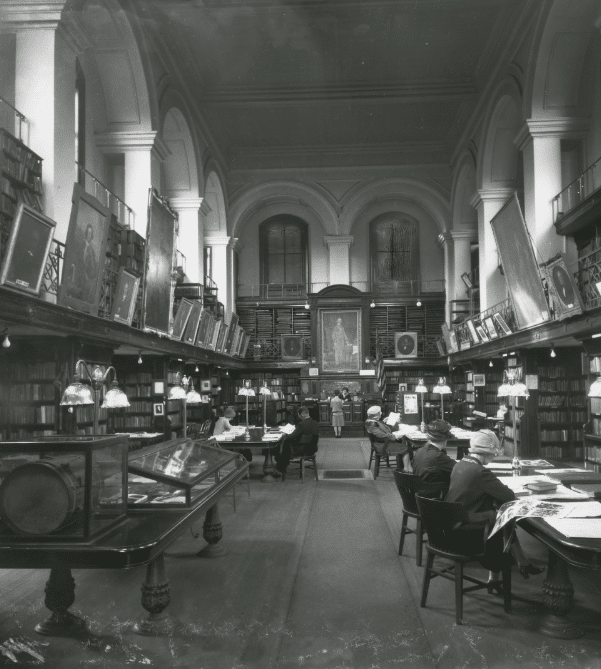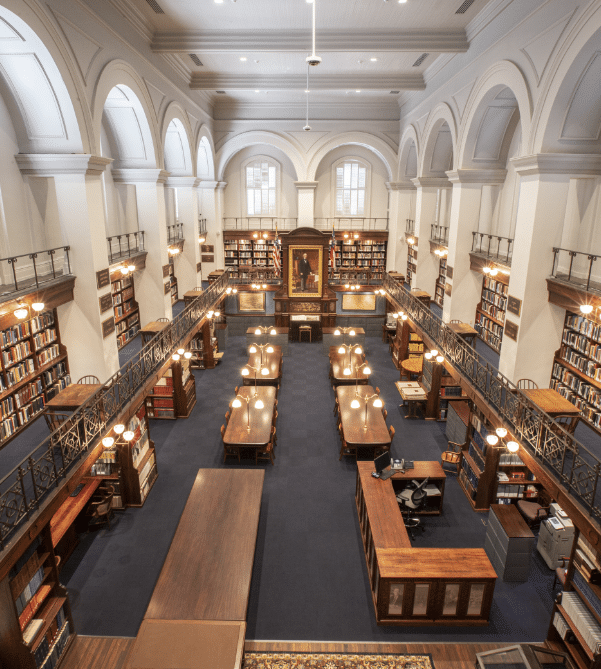History of the GHS Research Center
For many people, the Georgia Historical Society’s Research Center isn’t just part of the GHS headquarters in Savannah—for them it is the Georgia Historical Society.
Even though GHS is a statewide institution, and a nationally recognized leader among public history organizations, the GHS Research Center remains for many the heart of the Society, a revered and beloved landmark on the southwest corner of Whitaker and Gaston streets, across from Forsyth Park.
For nearly a century and a half, this architectural jewel in Savannah’s Historic Landmark District has housed one of the most unique and oldest collections of Georgia history in the nation. Comprised of historic Hodgson Hall (1876) and the attached Abrahams Archival Annex (1970), along with the new archival wing that dramatically expands storage capacity, each edition of the Research Center has been erected during a period of great change in our state and nation. Despite the ever-evolving political, economic, cultural, and social landscapes in Georgia, the Research Center has remained a foundational place for those who wish to better understand our state’s fascinating history.


As Georgia has changed over time, so has the GHS collecting mission.
The GHS Research Center represents steadiness and continuity when it comes to exploring our state’s past. In order to reflect Georgia’s historical evolution, the GHS collecting mission has broadened and expanded to better preserve the perspectives of Georgia’s changing populations, which helps us maintain an organic understanding of who we are as Georgians today.
In addition to continuing to collect the traditional materials of history, the GHS collecting mission has expanded to reflect the diversity of Georgia’s changing population. These perspectives are vital to gaining a better and more full understanding of the lived experiences of all Georgians throughout our history. As our perspectives on the past change, the GHS Collections housed in the Research Center grow to reflect those changes as well.
The foundation of the Georgia Historical Society is one of the oldest and most important library and archival collections in the United States.
And that collection is impressive: The GHS Research Center preserves an unparalleled collection of Georgia and American history, including more than 5 million manuscripts, 100,000 photographs, 30,000 architectural drawings, over 20,000 rare and non-rare books, and thousands of maps, portraits, and artifacts, representing the sweep of Georgia history from the founding to the present.
Among the nationally significant materials is an original draft copy of the United States Constitution, one of only 12 in existence; correspondence from Governors, U.S. Supreme Court Justices, and U.S. Presidents from Thomas Jefferson to Bill Clinton; the records of the Council of Safety that governed Georgia during the Revolutionary War; important documents related to the Cherokee and Creek Indians, including the papers of federal Indian agent Benjamin Hawkins, a Cherokee syllabary and newspapers, and records kept by federal commissioners during Cherokee Removal; documents on African-American history, such as slave records, Gullah-Geechee photographs, music, and oral histories, a growing collection of Civil Rights Movement records such as those of Rome NAACP president Ethel Hyer; the collection of Girl Scout founder Juliette Gordon Low; the World War II-era collection of journalist Lois Dozier Norvell; the papers of U.S. Attorneys General John Macpherson Berrien and Griffin Bell; and the collection of environmental activist and sustainability pioneer Ray C. Anderson, as well as the papers of early environmentalist and suffragist Helen Dortch Longstreet.
In the Vince Dooley Collection, you can see every letter that Coach Dooley wrote and received during his long coaching career at UGA, along with his busy calendars that track recruiting visits, like the one in January 1980 to Wrightsville to visit a high school senior named Herschel Walker.
The manuscript collection includes family papers, military records of every Georgia war, the papers of Georgia’s major political leaders, colonial account books, diaries, plantation records, papers of women’s social and cultural organizations, and business records ranging from the 18th through the 21st centuries.
The periodical collection dates from the 18th and 19th centuries, and the visual material collection includes an impressive variety of photographs and other images including portraits of many of Georgia’s most prominent leaders.
Hodgson Hall itself is a treasure of the Georgia Historical Society’s collection, a true architectural masterpiece. One of the oldest library buildings in the United States, Hodgson Hall was designed and built in 1876 as a library and headquarters for GHS by American Institute of Architects founder Detlef Lienau and is listed on the National Register of Historic Places.
The building was a gift of Margaret Telfair Hodgson and Mary Telfair as a memorial to William B. Hodgson, Margaret’s husband and a prominent Savannah citizen, American diplomat, and scholar of Middle Eastern studies, who died in 1871.
In 1970, needing more archival storage space, GHS built the adjacent two-story Abrahams Annex. Named in memory of Edmund H. Abrahams, lawyer-historian of Savannah, this addition– the first physical expansion in over 90 years–provided an updated archival facility for housing GHS’s growing collection of priceless materials.
In 2019, the Research Center opened a new chapter with the beginning of a large-scale renovation and expansion project. Completed in the fall of 2021, the project included a new archival wing as well as renovated and reconfigured spaces for archival processing, digitization, and specialized storage. The renovation also included updates to security, ventilation, and fire suppression systems, as well as updates to the Reading Room to improve both the form and function of that storied space.
Plan Your Visit to the GHS Research Center
Get details on our location, hours, and what to bring.
